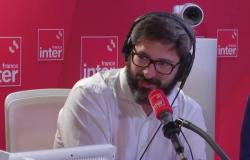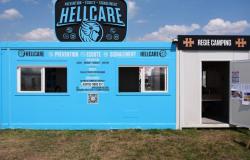En 2015, at the height of the migration “crisis”, Bretons from Monts d’Arrée, in Finistère, decided to provide support to migrants who were around Calais. Very quickly, under the leadership of a few activists, the association Les Utopistes en action was created with the aim of helping exiled people and in particular unaccompanied minors present in Finistère.
The alternative school, a voluntary educational structure, was created in 2018 first in the town of Cloître-Saint-Thégonnec. A reception house will follow, a place of accommodation for the school’s young students. Today, and since 2021, the school has moved to the town of Pleyber-Christ with the support of its mayor, Julien Kerguillec, and the municipal council.
The structure welcomes around fifteen young people and receives between fifteen and twenty students at school every day. Among all those who passed·es through the school, many now live and work in the region. A strong bond has been created over the years between the school, the volunteers and the young people welcomed.
Cohabitation with residents·The surrounding area has always been good, especially thanks to the help of local volunteers. But the results of the European elections of June 9, where the National Rally received more than 31% of the votes at the national level and a quarter of the votes in Finistère and in the two communes of Pleyber-Christ and Cloître-Saint-Thégonnec, make fear what will happen after the early legislative elections of June 30 and July 7.
The statue marks the entrance to the town of Pleyber-Christ where the Monts d’Arrée alternative school has been hosted since 2021 with the support of the municipal team. Previously, the school was located in the commune of Cloître-Saint-Thégonnec before the change of mayor following the 2020 municipal elections.
©Olivier Ceccaldi
Pleyber-Christ, June 19, 2024. That morning, at the alternative school, Pierre waits before the start of classes. For him, the historic result of the National Rally in the European elections does not concern him. Of course, he has seen the news about the political situation on television but doesn’t really see how it will affect his daily life. Arriving at school at the start of the year, he became the house’s official hairdresser. Besides, he tells himself that perhaps, one day, he will be able to make it his profession.
©Olivier Ceccaldi
Florence, volunteer, welcomes a new young person to the alternative school. She carries out a French comprehension test with him to be able to assess his academic level and adapt his schedule. For the volunteer, “the association has no political vocation”. And even if she considers the current situation worrying, Florence insists on the fact that “the main goal of the school is to continue to welcome and support” students.
©Olivier Ceccaldi
The school’s students take a break in the sun before heading back to class. For these young people, it is difficult to understand the future. Some do not see the difference between the prospect of the National Rally coming to power and the current migration policy which already rejects them.
©Olivier Ceccaldi
Sten is an educator employed by the association. Having lived in the region for years, he sees in the results of June 9 the “confirmation of an increasingly liberated racist discourse” around him.
©Olivier Ceccaldi
In the school hallway, the pages of the book Morning Brown by Franck Pavloff are displayed on the wall. The work tells how fascism takes power and gradually imposes a unique and racist way of thinking.
©Olivier Ceccaldi
In the town of Cloître-Saint-Thégonnec, Sandrine Corre, founder of the Les Utopistes en action association and director of the alternative school, at home. She doesn’t say to herself “no surprise” by the results of the European elections which “were to be expected” in view of the « sentiment d’abandon » felt by many residents of the region. She recognizes that there are racist people, and knows from experience that fears disappear as soon as a bond is created, for example, between young people and residents. What scares Sandrine Corre the most is “the arrival in politics of these extreme right ideas”, even though the effects of the tightening of migration policy are being felt in particular by prefectures when applying for or renewing residence permits. For her, “we must prepare to face the takeover of power by the National Rally” by continuing to keep alternative schools alive, especially if tomorrow “what we are doing is becoming illegal”.
©Olivier Ceccaldi
Julien Kerguillec, mayor since 2020 of Pleyber-Christ, in the town hall common room. In 2021, the mayor and the municipal team supported the installation of the alternative school in the town. This decision was “the logical continuation of the city’s commitment to welcoming refugees”, since 2015 and the opening of a reception center in the current premises of the school, specifies the mayor. He was ” surprised “ by the local results of the National Rally on June 9, and perceives them as “a vote sanctioning the policy of the current government”. But at the municipal level, he did not observe any racist behavior and “does not envisage the victory of the RN at the local level” in the legislative elections of June 30 and July 7. A victory at the national level “would not change anything in the commitment made to welcoming the school” within the municipality, he assures.
©Olivier Ceccaldi
Le Cloître-Saint-Thégonnec in November 2023. The forest which extends between the reception house and the town of Pleyber-Christ has for years become a popular place for the many young people welcomed at the house. For Joseph*, it is here that he “managed to regain calm” after the madness of the road to exile. Today he still lives in the area and works as an electrician for a local company. He comes back here from time to time to recharge his batteries and hopes that the situation “won’t get more complicated” for him and the other students at the school after July 7.
©Olivier Ceccaldi
Letters of insults and threats received last March by Sandrine Corre, director of the alternative school. The letter follows numerous press articles which have reported the support given to Alhassane, a former student who has been fighting for months to obtain a residence permit.
©Olivier Ceccaldi
Adama*, an Ivorian minor, prays in his room in the reception house located in the commune of Cloître-Saint-Thégonnec. A month earlier, a man tried to set fire to the Morlaix mosque, where young people from the alternative school sometimes go for Friday prayers. This act takes place in a context of increasing attacks from the extreme right on Breton soil, in Callac, Saint-Brevin, Rennes, among others.
©Olivier Ceccaldi
One of the school’s students, Karamoko, is interning at a local DIY store. The solidarity between the residents of the city and the school is still relevant today. For this young man, “learning to work means better understanding how people live here”.
©Olivier Ceccaldi
Le Cloître-Saint-Thégonnec, in February 2024. On the path leading to the alternative school, a message of support for exiled people is written in Breton: “Repuidi Deuet Mat”, which means “Welcome to the refugees”. It is a slogan carried by Breton anti-fascist movements.
©Olivier Ceccaldi
*first names have been changed upon request





